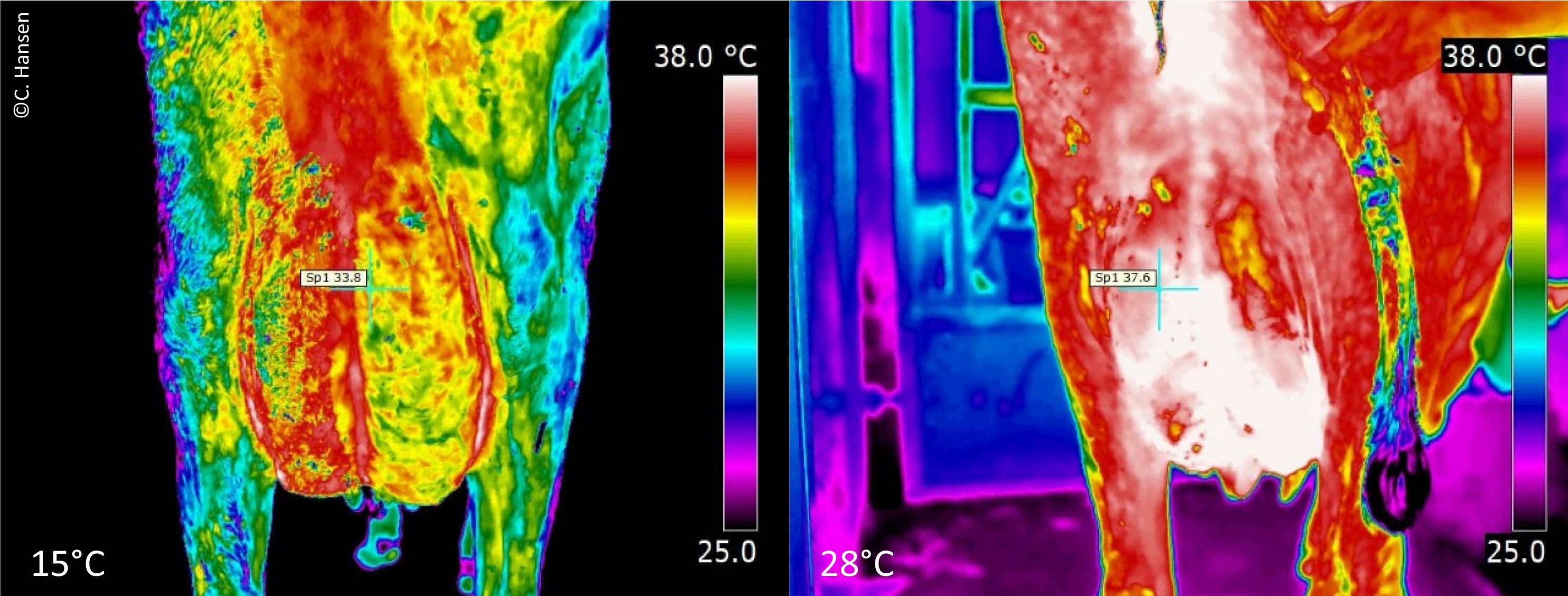



LeakyCow: When heat attacks the gut
Cows suffer from high summer temperatures - the Research Institute for Farm Animal Biology is searching hard for solutions.Digestive tract health plays a key role in the well-being of dairy cows. If they are exposed to too much heat, it can lead to pathological permeability of the intestinal wall, the so-called "leaky gut syndrome" (permeable gut syndrome). But how can the animals be better protected in times of climate change? Scientists at the Research Institute for Farm Animal Biology (FBN) Dummerstorf are working hard in the context of the project "LeakyCow” - funded by the German Research Foundation (DFG) - to find solutions for better intestinal health in dairy cows.
Four years ago, researchers at FBN were able to demonstrate for the first time that high ambient temperatures in dairy cows can directly affect the natural intestinal barrier. A protective intestinal barrier damaged by heat opens the way for bacteria and other pathogens to increase and possibly penetrate deeper into the layers of the intestine. Similar processes of a disturbed intestinal barrier also occur in humans, among others in the disease patterns of celiac disease or Crohn's disease.
Negative effects possible from as low as 15 degrees
Heat waves and extreme weather phenomena will continue to increase in the coming decades because of climate change. This change poses health and economic challenges for agriculture and its animals alike. Already from an ambient temperature of about 15 °C and 70% humidity and the derived temperature-humidity index (THI), dairy cows show the first signs of heat stress. In addition, to shorten lying times and lower feed intake, they show a faster respiration and higher heart rate. If the ambient temperature rises even further, the body temperature increases and the animals start panting. As a result, they lose large amounts of fluid and minerals and produce less milk.
Relatively new and not yet sufficiently understood are the possible effects on intestinal health. In order to dissipate heat from the body surface, blood flow to the intestines of dairy cows decreases. The intestinal wall then becomes permeable, which can result in subliminal inflammatory responses in the intestine and adjacent lymph nodes. Above all, the cows' immune system takes up a lot of the energy in counteracting the effects of "leaky gut syndrome," the pathological permeability the intestinal wall.
Amazing strategies against the heat
At the Research Institute for Farm Animal Biology (FBN), a team of scientists led by Dr. Franziska Koch from the Institute of Nutritional Physiology "Oskar Kellner" is now investigating the effects of the "leaky gut syndrome" in more detail in order to develop new approaches to solutions for feeding and housing conditions when hot spells occur. These should primarily serve the health and well-being of the cows, but also counteract the economic losses due to lower milk yield.
To investigate the influence of short-term and long-term heat stress on immune defense, intestinal permeability and colonization of the intestinal mucosa, the researchers exposed dairy cows to different ambient temperatures at the FBN. While the control group fared well at an environment of 15 °C, another group of animals was exposed to temperatures of 28 °C in the climate room.
"This produced some astonishing initial results," explained project leader Dr. Franziska Koch. "It was shown that heat-stressed animals do not use fat reserves to compensate for the lack of energy. In the contrary, cows under heat stress break down endogenous proteins for energy production. This ensures that less heat is generated when nutrients are broken down and that the cow does not become additionally warmer."
By using thermal cameras, it was also possible to prove that the udder is the hottest part of the body, a lot of heat can leak from this part of the body and the risk of udder inflammation increases. These results were found in cooperation with the Mecklenburg-Vorpommern State Research Institute for Agriculture and Fisheries (LFA).

Outlook: Concrete results in the coming year
"Heat stress significantly affects animal welfare. It is therefore important to understand basic mechanisms under heat stress in order to develop practical approaches to solutions for livestock farming," Dr. Franziska Koch emphasized. "For example, cooling with water, a scarce resource, is not a viable alternative everywhere, whereas installing fans in livestock buildings would be a sensible investment, but one that involves high energy and investment costs."
With the completion of the "LeakyCow" research project next year, the scientists will present first concrete proposals for improved heat stress management for dairy cows.
Headline image: Dr. Franziska Koch is looking for solutions to reduce heat stress in dairy cows, here with technical assistant Tanja Lenke (right) in the research barn. Image courtesy of FBN/Nordlicht


